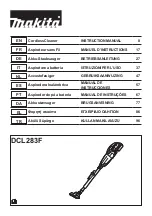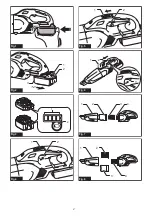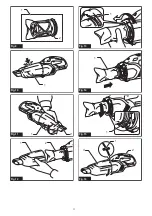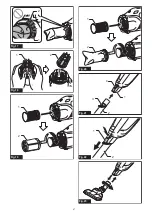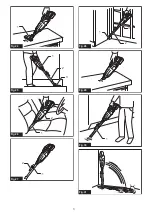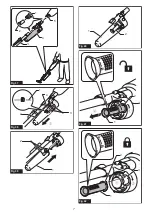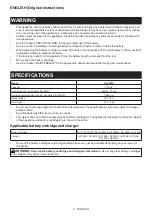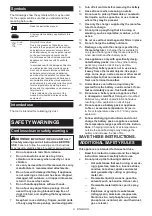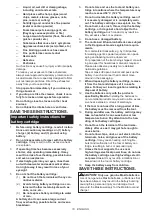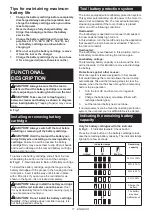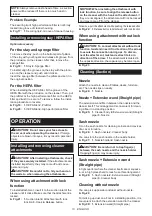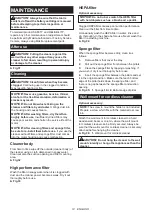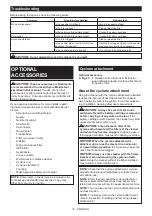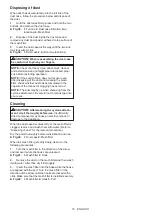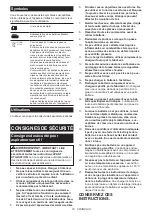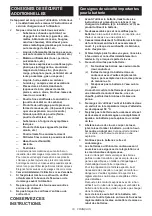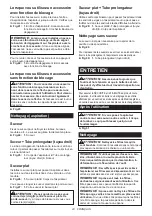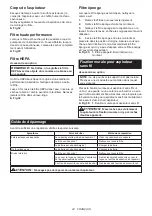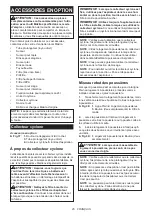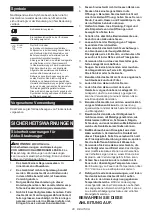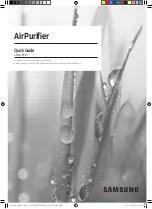
13 ENGLISH
NOTE:
Always remove dust ahead of time, as suction
power will be reduced if there is too much dust in
cleaner.
Problem Example
The securing lip of high performance filter is not firmly
locked into groove of cleaner housing.
►
Fig.17:
1.
Securing lip
2.
Groove of cleaner housing
Installing or removing stay / HEPA filter
Optional accessory
For the stay and sponge filter
To remove the stay, push up the bottom part of pillars
of the stay with your fingers and release its groove from
the protrusion on the cleaner. After that, remove the
sponge filter.
►
Fig.18:
1.
Stay
2.
Sponge filter
To install, align the grooves on the stay with the protru-
sion on the cleaner and push until it clicks.
Insert the sponge filter between the pillars and set it in
the original position.
For the HEPA filter
When installing the HEPA filter, fit the groove of the
HEPA filter with the protrusion on the cleaner. Then, put
the prefilter or the high performance filter on the HEPA
filter and twist it to secure. To remove, follow the instal
-
lation procedure in reverse.
►
Fig.19:
1.
HEPA filter
2.
Prefilter
►
Fig.20:
1.
HEPA filter
2.
High performance filter
OPERATION
CAUTION:
Do not move your face close to
the air vent when operating the cleaner.
If foreign
objects are blown into eyes, it may result in personal
injury.
Installing and removing cleaner
attachments
CAUTION:
After installing attachments, check
if they are securely installed.
If the attachments are
installed imperfectly, they may come off and cause
personal injury.
CAUTION:
Be careful not to hit your hand on
the wall etc. when removing the attachments.
When using attachment with lock
function
To install attachment, insert it to the suction inlet of the
cleaner until it clicks. Make sure that the attachment is
locked.
►
Fig.21:
1.
Suction inlet
2.
Attachment with lock
function
3.
Hook
4.
Release button
NOTICE:
When installing the attachment with
lock function, be sure to align the release button
on the cleaner with the hook on the attachment.
If
they are not aligned, the attachment will not be locked
and may come off from the cleaner.
To remove, pull the attachment while pushing the release button.
►
Fig.22:
1.
Release button
2.
Attachment with lock function
When using attachment without lock
function
CAUTION:
To connect attachment without lock
function, twist and insert it in direction of the arrow
to secure the connection during use. To discon-
nect the attachment, twist and extract it also in
direction of the arrow.
If the attachment is twisted in
the opposite direction, the capsule may become loose.
►
Fig.23
Cleaning (Suction)
Nozzle
Attach the nozzle to clean off tables, desks, furniture,
etc. The nozzle slips on easily.
►
Fig.24:
1.
Nozzle
Extension wand (Straight pipe)
The extension wand fits in between the nozzle and the
cleaner itself. This arrangement is convenient for clean-
ing a floor in a standing position.
►
Fig.25:
1.
Cleaner body
2.
Extension wand (Straight
pipe)
3.
Nozzle
Sash nozzle
Fit on the sash nozzle for cleaning corners and crevices
of a car or furniture.
►
Fig.26:
1.
Sash nozzle
2.
Cleaner body
You can store the sash nozzle in the nozzle holder.
►
Fig.27:
1.
Nozzle holder
2.
Sash nozzle
CAUTION:
Be careful not to trap finger(s)
between the sash nozzle and the nozzle holder.
Trapping finger(s) may cause injury.
Sash Extension wand
(Straight pipe)
In tight quarters where the cleaner itself cannot squeeze
in, or in high places hard to reach, use this arrangement.
►
Fig.28:
1.
Sash nozzle
2.
Extension wand (Straight
pipe)
3.
Cleaner body
Cleaning without nozzle
You can pick up powder and dust without nozzle.
►
Fig.29
For picking up dust on a floor in a standing position, it is
convenient to attach the extension wand to the cleaner.
►
Fig.30:
1.
Extension wand (Straight pipe)
Summary of Contents for DCL283FZW
Page 2: ...2 Fig 1 1 2 3 Fig 2 1 2 Fig 3 1 2 Fig 4 1 2 Fig 5 1 2 3 Fig 6 1 3 4 2 Fig 7 1 2 3 4 Fig 8 ...
Page 3: ...3 2 1 Fig 9 1 Fig 10 1 2 Fig 11 1 2 Fig 12 1 Fig 13 1 Fig 14 1 Fig 15 1 2 3 Fig 16 ...
Page 4: ...4 1 2 Fig 17 1 2 Fig 18 1 2 Fig 19 1 2 Fig 20 1 2 3 4 Fig 21 1 2 Fig 22 Fig 23 ...
Page 5: ...5 1 Fig 24 1 2 3 Fig 25 1 2 Fig 26 1 2 Fig 27 1 2 3 Fig 28 Fig 29 1 Fig 30 Fig 31 ...
Page 6: ...6 Fig 32 Fig 33 Fig 34 1 2 Fig 35 1 Fig 36 ...
Page 7: ...7 3 4 1 2 5 Fig 37 2 3 1 4 Fig 38 2 1 Fig 39 2 1 Fig 40 1 2 Fig 41 1 2 3 Fig 42 ...

